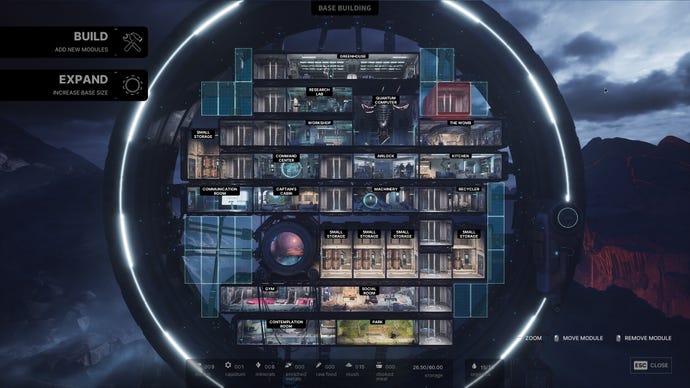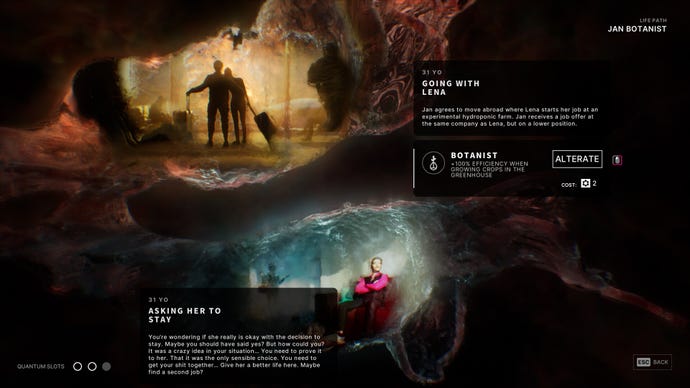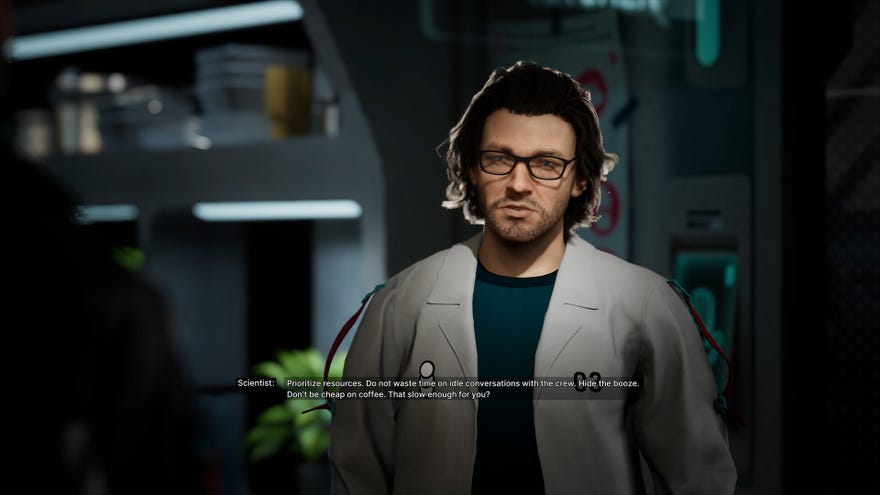You can’t have sex with yourself in The Alters, “but it’s not like this topic is totally removed”
And nor is the topic of generative AI
Call me a Paranoid Android or a Suspicious Stanley, but when I ask a videogame developer a question and the videogame developer pauses for exactly 31 seconds and then says “no”, I tend to assume the answer is, in fact, “yes”. Or at least “it’s complicated”, to channel a bit of antique Facebook coyness. The Alters is a complicated game. It is a moody sci-fi extravaganza in which your character, beleaguered offworld miner Jan Dolski, has to create new versions of himself by branching off his own past timeline using a "quantum computer", splitting the chain of events at trigger points by, say, having his younger self stand up to his domineering father rather than leaving home.
The result is a rolling space base full of alternate, vat-grown Jans, from bitter repairman Jans to aloof scientist Jans and all the many glittering gradations of Jan that lurk betwixt. The Jans have a hard time getting along, initially. The shared existential horror of everybody being a version of everybody else aside, they all represent each other’s roads-not-taken, a premise that leaves ample room for resentment, envy and contempt. But jolly along they must, in order to operate the aforesaid rolling space station and escape the apocalyptic planet they’re stranded on. Assuming you make the right dialogue decisions as Jan Prime, and ensure each Jan’s material needs are met while upgrading and expanding the station, this practical objective will produce a growing closeness, punctuated by swirly notifications about changes of emotional state, which feels like one big, baroque metaphor for a guy making peace with his own past and warring urges.

It’s both a fun narrative setup and the makings of a production nightmare, to say nothing of the presumably enormous strain placed upon the vocal chords and mental coherence of Jan’s sole voice actor, Alex Jordan. There’s the intricacy of each Jan’s personality in itself, and then there’s the problem of writing up all their interactions, and how they might develop in response to each other - depending on which Jans the player decides to spawn in whatever order. 11 bit have managed this potential for overwhelming complexity by, firstly, only giving you charge of one Jan, the primary Jan who gets to sleep in the captain’s bedroom at the base’s heart, and secondly, by firmly resisting the temptation to do a Flanders family reunion and conjure up a Jan for every genre or season. There are, as far as I can tell, no Janpunks, Cowboy Jans, Jan 3000 BCs or other Expanded Janiverse misadventures in The Alters. 11 bit have limited the population carefully to keep the quality up and suit the particular dilemmas they want to explore.
“We had the idea of what are the most important problems or maybe decisions that players can relate to, and built upon that was the decision of how many Alters do we want to have,” lead designer Rafal Wlosek told me. “We want to have enough Alters to talk about all those things, but not too many, so we wouldn't drown in in writing the shallow stories. So there are more Alters hidden [in the game] then you can find in one playthrough, but just enough for us to get deep into each type of decision and where they came from - what type of person will he become? What will he decide to believe in? How does it work for him in his life, for the people around him?”
Looking beyond the tension between multiversal storytelling and project management, the idea of duplicating somebody by reaching into their backstory and yanking levers has a certain amount of overlap with current discussions about generative AI and its questionably legal and often intrusive reuse of data shared online. Jan is not the architect of the quantum computer – he is shocked to discover that it is loaded with his entire life history, with one character noting that he probably should have read the small print on his mining contract. 11 bit had a booth at their Alters hands-on event where journos could chat to AI-generated characters. When I asked Wlosek about this, however, he insisted that The Alters isn’t designed to offer “food for thought” on AI.
“There was a time when we were discussing the idea of an AI being part of the quantum computer - maybe creating a character out of this machine,” he said. “But we wanted to focus on one topic at a time. And we didn't want to, you know, put the spotlight on too many different aspects of sci-fi.” To be clear, the quantum computer AI would have been a written character, not a piece of text-generating software. “I think it was [conceived] before GPT showed up to the general public,” Wlosek added. “Personally, of course, I'm very interested in how things are going in this area. This is something that probably everyone who knows what's going on is interested in, and will be watching closely, but it’s not in this game.”

Among the broader strokes that differentiate one Jan from another is romantic history. Jan Prime has signed up for offworld mining duty partly because he’s broken up with his wife, who plays an active role nonetheless in the plot. One of the other Jans is from a Janiverse where his wife has died, and is naturally frantic to discover that she’s still alive in Jan Prime’s continuity. The topic of lovelives, together with the conspicuously cramped confines of the rolling space base and the emphasis on building a rapport with other Jans, got me wondering just how far Jan’s evident vast self-absorption might go. Is it possible for Jans to romance other Jans? And with a view to getting ahead of the Rule34 crowd - can they bone?
“No they don’t,” Wlosek said, exactly 31 seconds later. “But it’s not like this topic is totally removed. The whole game is about thinking about your decisions, about your life, going back to those decisions, if they were good or wrong, and dwelling on them, and maybe we want to show this from very different angles, to give the player the space to think about it. And in order to do that, we had to take a look at every aspect of life, so I guess that would be my general answer! It's not like having sex with the other Alters or anything like that, but the romantic relations of a couple of the Alters are very important, and not all of them are with women.”


